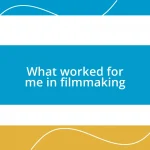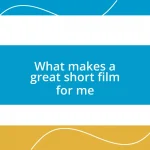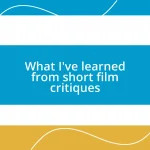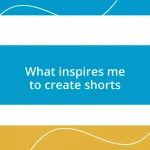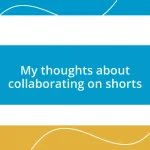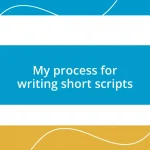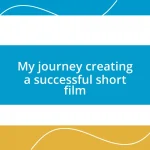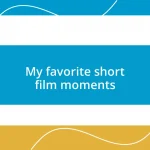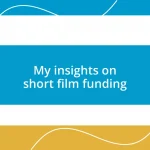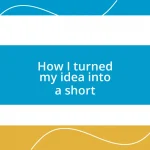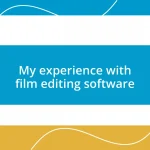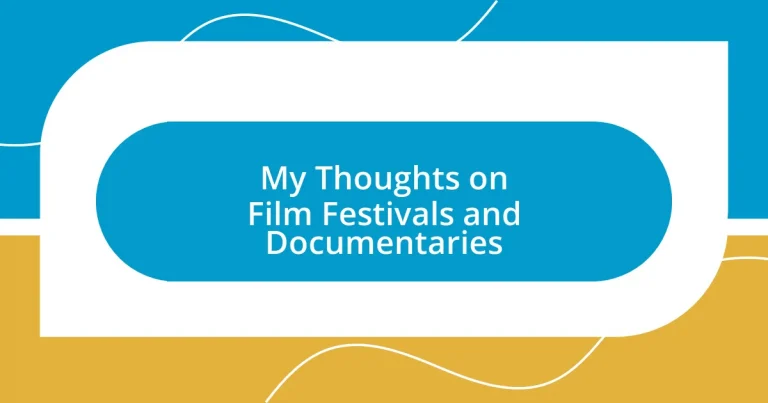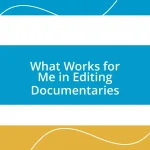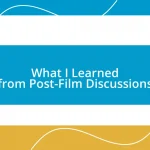Key takeaways:
- Film festivals foster community and amplify diverse voices, creating opportunities for filmmakers to share unique stories that challenge societal norms.
- Documentaries educate, preserve cultural narratives, and encourage critical thinking, often inspiring viewers to take action on important issues.
- Engaging with audiences and leveraging social media can enhance a documentary’s impact, creating lasting connections and fostering meaningful discussions.
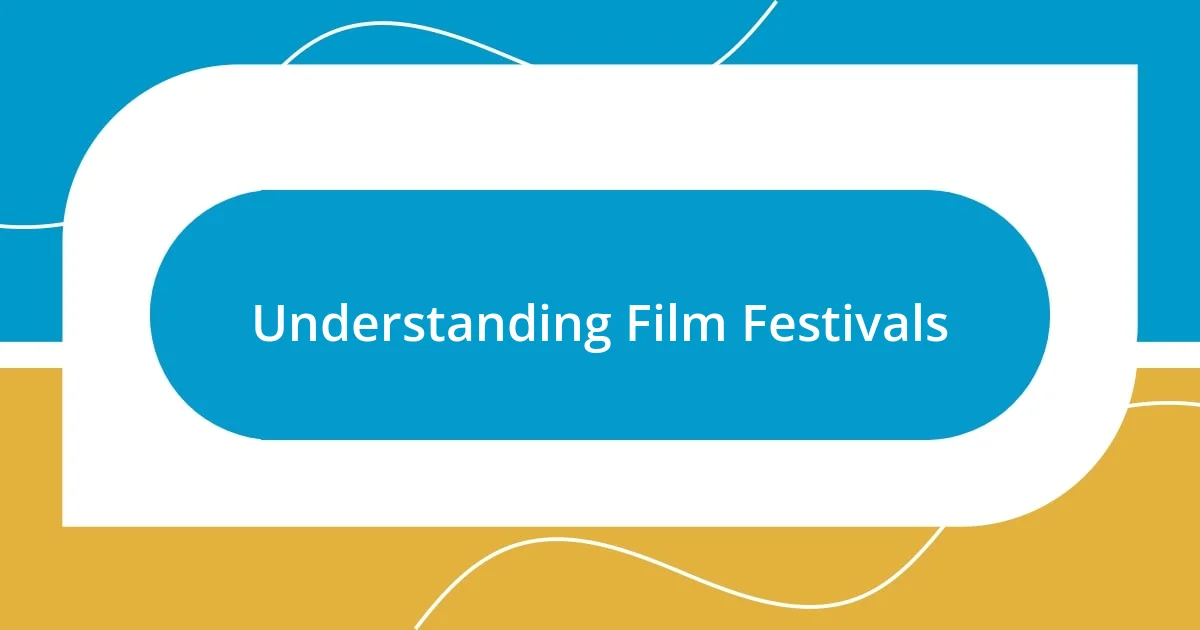
Understanding Film Festivals
Film festivals are vibrant platforms where creativity meets culture, often serving as a launchpad for new filmmakers. I remember the electricity in the air at my first festival—there’s an undeniable thrill that comes from sharing stories with like-minded individuals. Isn’t it fascinating how these gatherings can feel like a big family reunion, with each film acting as a conversation starter?
What strikes me most about film festivals is the diversity of voices they amplify. I once attended a festival focused on underrepresented communities, and the passion displayed by filmmakers was infectious. Have you ever felt a connection with a film that seemed to echo your own experiences? That’s the beauty of these events; they bring stories to life that resonate deeply with audiences and challenge societal norms.
Moreover, film festivals are often where you discover films that you wouldn’t typically find in mainstream circles. I recall stumbling upon a documentary that completely changed my perspective on an issue I thought I knew everything about. Isn’t it amazing how a single film can open our eyes and inspire us to think differently? Each screening is a new opportunity for enlightenment, pushing the boundaries of what we think we understand.
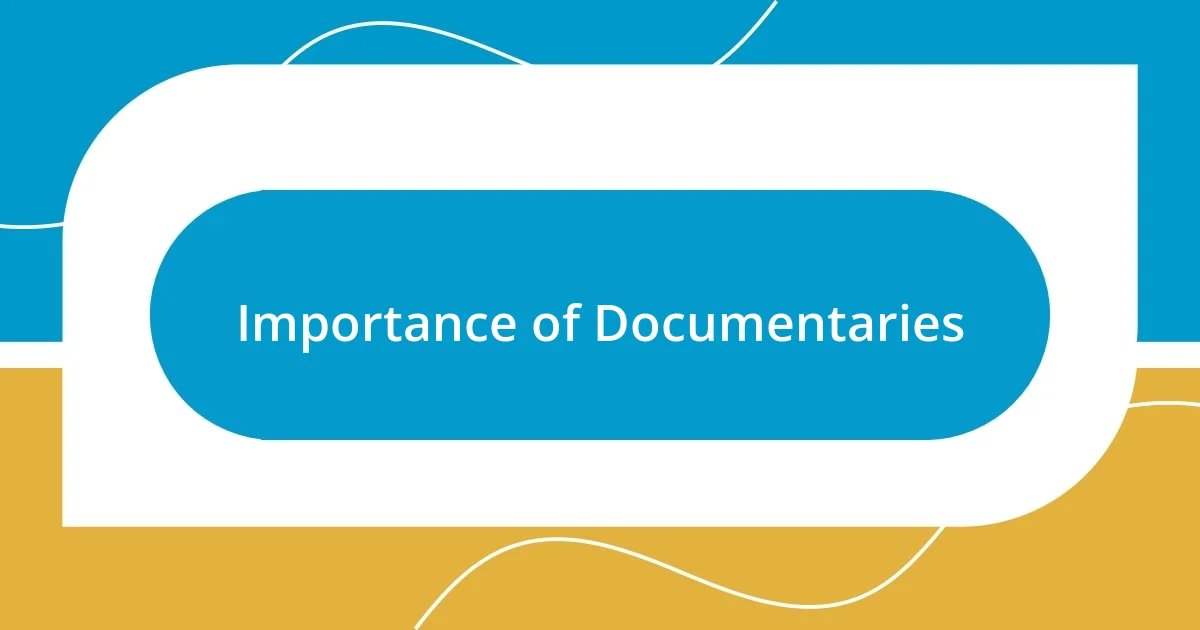
Importance of Documentaries
Documentaries hold a special place in the world of storytelling. They educate and inform viewers, often unveiling truths behind social issues, cultures, and histories we might otherwise overlook. I remember watching a documentary on climate change that left me both inspired and motivated to make small changes in my own life. Have you ever felt that urge to take action after learning something new? Documentaries can be powerful catalysts for change.
Another key aspect is their ability to preserve voices and experiences that might fade into obscurity. I once encountered a documentary chronicling the life of a local artist who had been largely forgotten over time. It was eye-opening and made me realize how essential it is to document these stories. After all, aren’t our unique narratives worth preserving for future generations?
Finally, documentaries often encourage critical thinking. They challenge us to question the information we consume daily. I think back to a documentary I watched that presented multiple perspectives on a controversial topic. It sparked meaningful discussions among my friends and me, pushing us to dig deeper. Isn’t that what great art should do—encourage us to think, reflect, and engage with the world around us?
| Importance of Documentaries | Effects |
|---|---|
| Education and Awareness | Inspires change, prompting viewers to act. |
| Cultural Preservation | Preserves vital stories for future generations. |
| Encourages Critical Thinking | Challenges viewers to assess multiple viewpoints. |
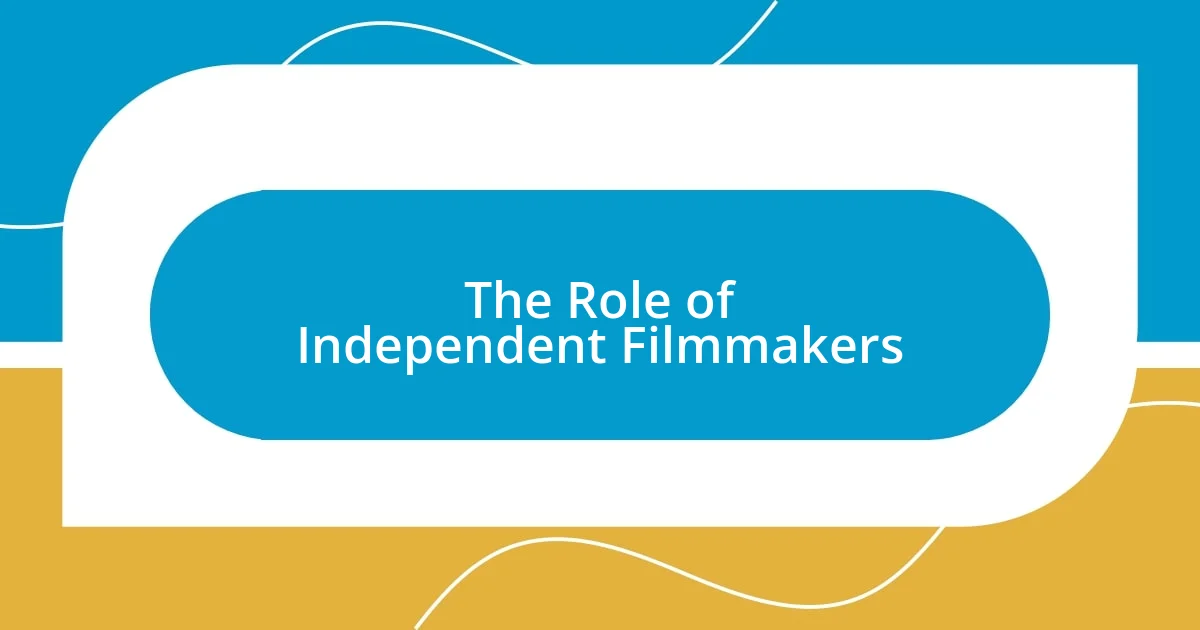
The Role of Independent Filmmakers
Independent filmmakers play a crucial role in enriching the cinematic landscape. They often dive into stories that mainstream studios might overlook, focusing on nuanced perspectives and raw emotions. I once met a filmmaker who pooled together resources from her community to tell the story of a forgotten neighborhood. It was inspiring to witness how personal experiences can be transformed into compelling narratives that resonate deeply with audiences.
- They challenge mainstream narratives, bringing diverse voices to the forefront.
- Independent films often take creative risks, allowing for innovation and experimentation.
- These filmmakers frequently connect intimately with their audiences, fostering a sense of community and shared experience.
- Many rely on grassroots support, highlighting the importance of local engagement and passion in the filmmaking process.
- They leverage film festivals as a stepping stone for recognition, allowing their unique visions to reach wider audiences.
In the world of film, the energy that independent filmmakers bring is palpable. Their stories illuminate the intersection of art and life, showcasing genuine moments often missing from commercial cinema. It’s hard not to feel a sense of pride when witnessing their work; every film is a testament to their dedication and love for authentic storytelling.
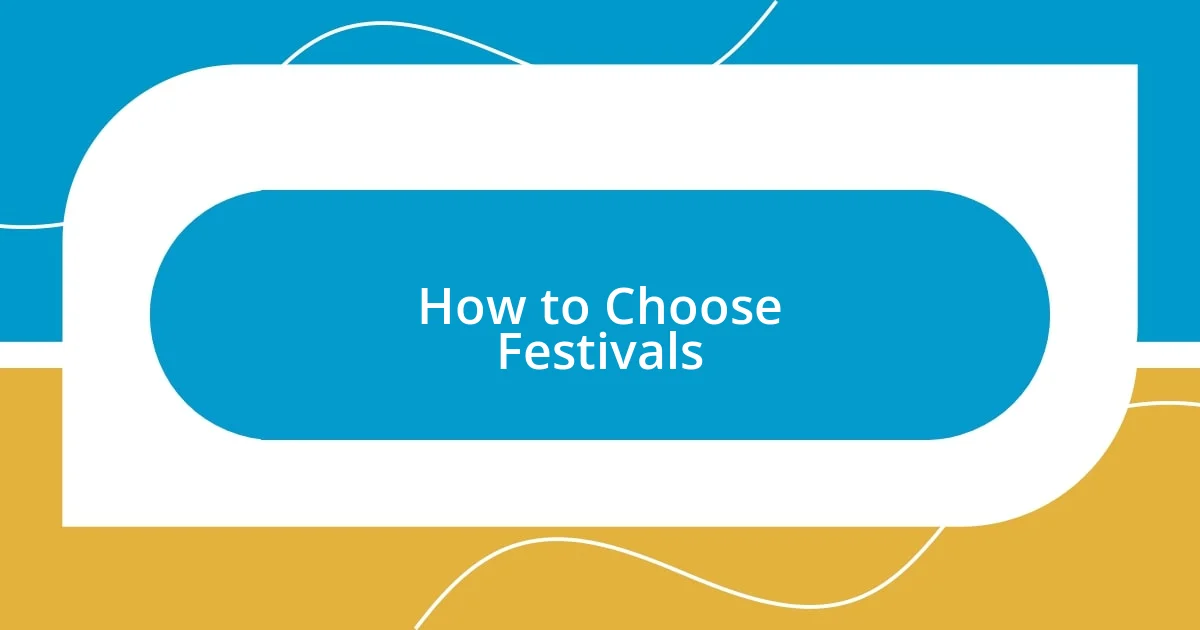
How to Choose Festivals
When it comes to selecting film festivals for your documentary, think about what aligns with your vision. I’ve found that focusing on festivals that celebrate documentary work—like Sundance or True/False—can provide a platform that truly appreciates the essence of what you’re trying to convey. Do you want your film to have the biggest impact possible? Look for festivals with a history of showcasing similar subjects or themes.
Moreover, consider the audience of each festival. I remember submitting to a smaller festival that specialized in environmental documentaries. I was pleasantly surprised by the depth of discussions my film sparked during post-screening Q&As. Isn’t it interesting how the right audience can elevate your work and even shape the conversations around it?
Lastly, factor in the networking opportunities each festival offers. Some festivals create spaces for filmmakers to connect, share ideas, and even find collaborative partners. I once attended a festival where I met a producer who later helped me refine my next project. Wouldn’t it be amazing to not only share your story but also build relationships that can support your journey ahead?
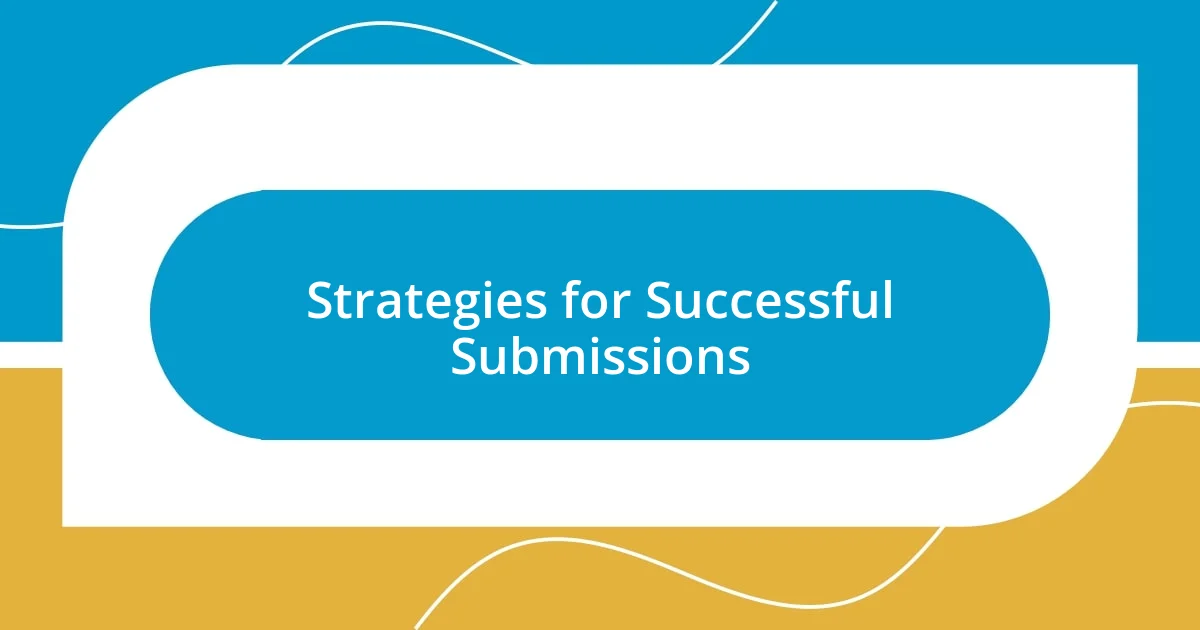
Strategies for Successful Submissions
When preparing your submission, attention to detail is paramount. I vividly recall meticulously tailoring the application materials for my documentary, ensuring that the synopsis reflected its emotional core. Have you ever felt that moment of clarity when everything comes together just right? A well-crafted pitch can make all the difference—it’s your chance to showcase not just the project, but your passion for it.
Additionally, I’ve learned the importance of adhering to each festival’s specific guidelines. One year, I submitted a film that didn’t quite meet a festival’s runtime requirement, which was disappointing. It made me realize that even the most compelling narrative can be sidelined due to slight oversights. Understanding the rules can save you time and heartache in the long run.
Networking doesn’t end at submission. After receiving feedback on another project of mine, I reached out to a few programmers for advice, just to chat about my future goals. I was amazed at how welcoming and open the festival community can be! Engaging with these professionals not only strengthened my connections but also broadened my understanding of what festivals truly seek. Are you ready to make those connections that could elevate your work to the next level?
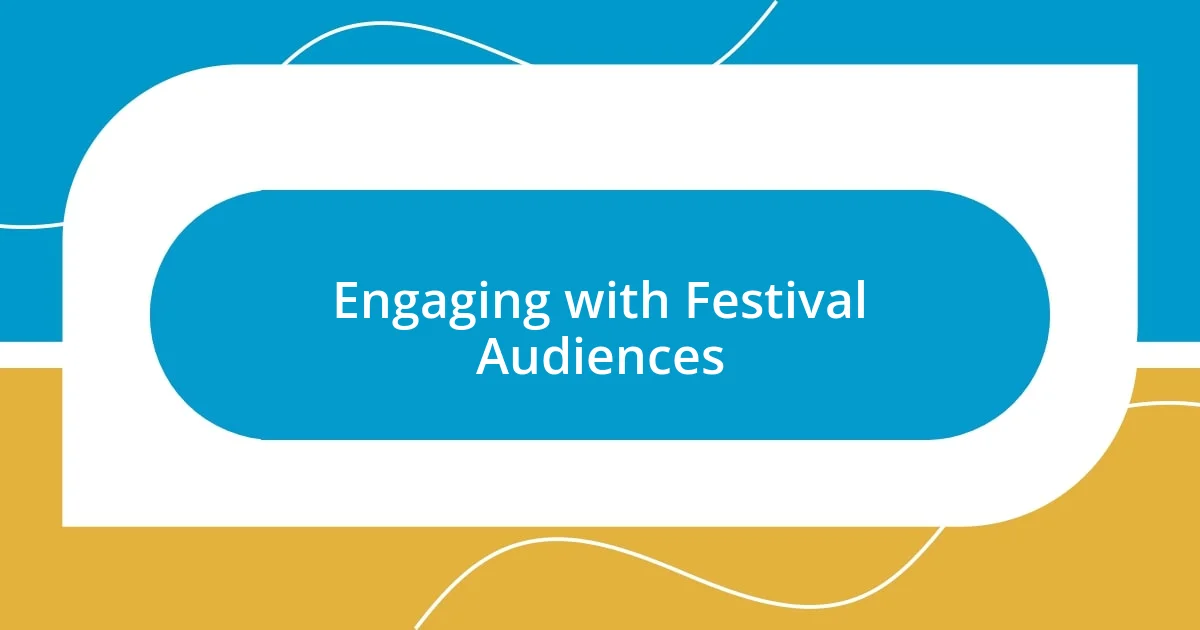
Engaging with Festival Audiences
Engaging with festival audiences is an exhilarating experience that can profoundly impact how your documentary is perceived. At a recent festival, I sat in on a screening where the audience reacted so emotionally that it led to a vibrant discussion afterward. Seeing how my work resonated with people from different backgrounds was both validating and eye-opening. How often do we get this kind of immediate feedback on our stories?
During one festival, I made a point to mingle with attendees between screenings. I was surprised by how many passionate viewers shared their thoughts, asking thought-provoking questions that pushed me to reflect on my documentary in new ways. It’s remarkable how these interactions can deepen your understanding of your own work. Have you ever paused to listen carefully to what viewers see in your film?
I believe that hosting interactive Q&A sessions can be a game-changer in fostering a connection with the audience. At one event, I prepared specific questions to stimulate dialogue and was genuinely amazed at the insights audience members shared. This not only made the viewing experience richer for everyone but also allowed me to grasp the diverse perspectives surrounding my film. Isn’t it inspiring how a simple conversation can unlock so many layers of understanding?
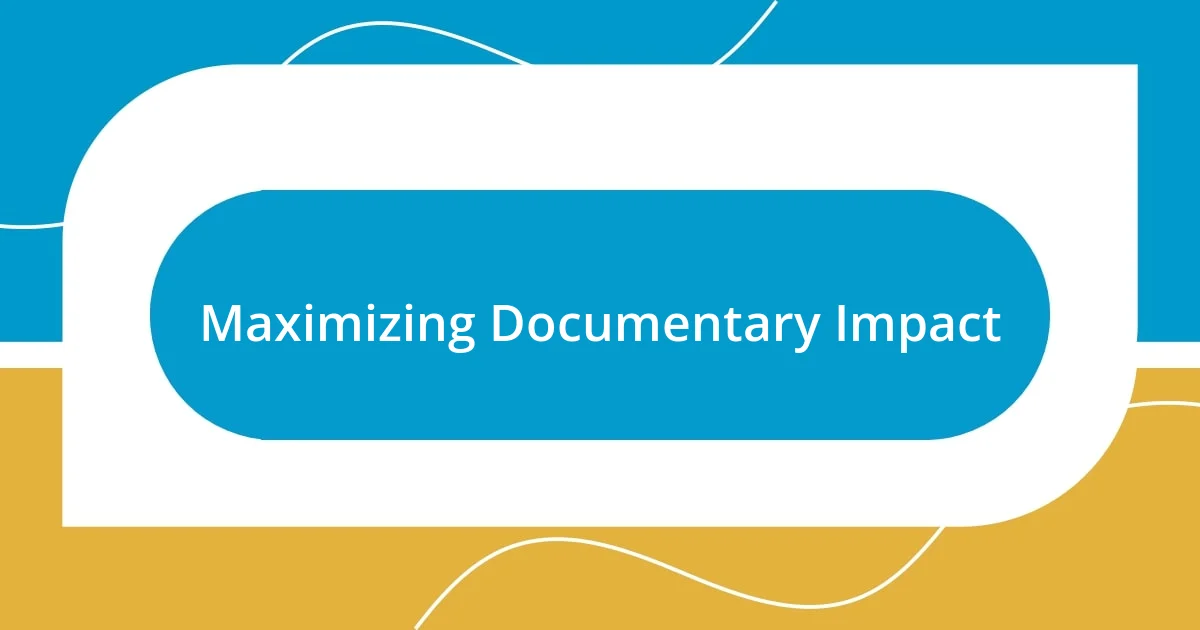
Maximizing Documentary Impact
Maximizing the impact of a documentary requires intentional storytelling that connects with viewers on a personal level. I recall screening my film at a local festival, where one audience member shared how a particular scene mirrored her own life experience. Hearing her emotional reaction underscored the transformative power of documentary storytelling—it’s not just about presenting facts, but about creating a shared experience that resonates deeply.
Another critical aspect is the use of social media to amplify your documentary’s message beyond the festival walls. When I launched a companion campaign on Instagram, documenting behind-the-scenes moments and sharing impactful quotes, I noticed increased engagement and interest in my work. Have you ever thought about how a simple post can spark conversations? Those interactions can turn a one-time screening into a vibrant community of advocates for your film.
Moreover, collaborating with experts and activists in your documentary’s subject area can greatly enhance its impact. For instance, I partnered with a local organization that aligned with my film’s themes, and through their network, we reached a wider audience. It was fascinating to see how their insights added depth to my narrative, showcasing the potential of collaboration in elevating a documentary’s message. Isn’t it amazing how working together can amplify not only our voices but also the stories we aim to share?
